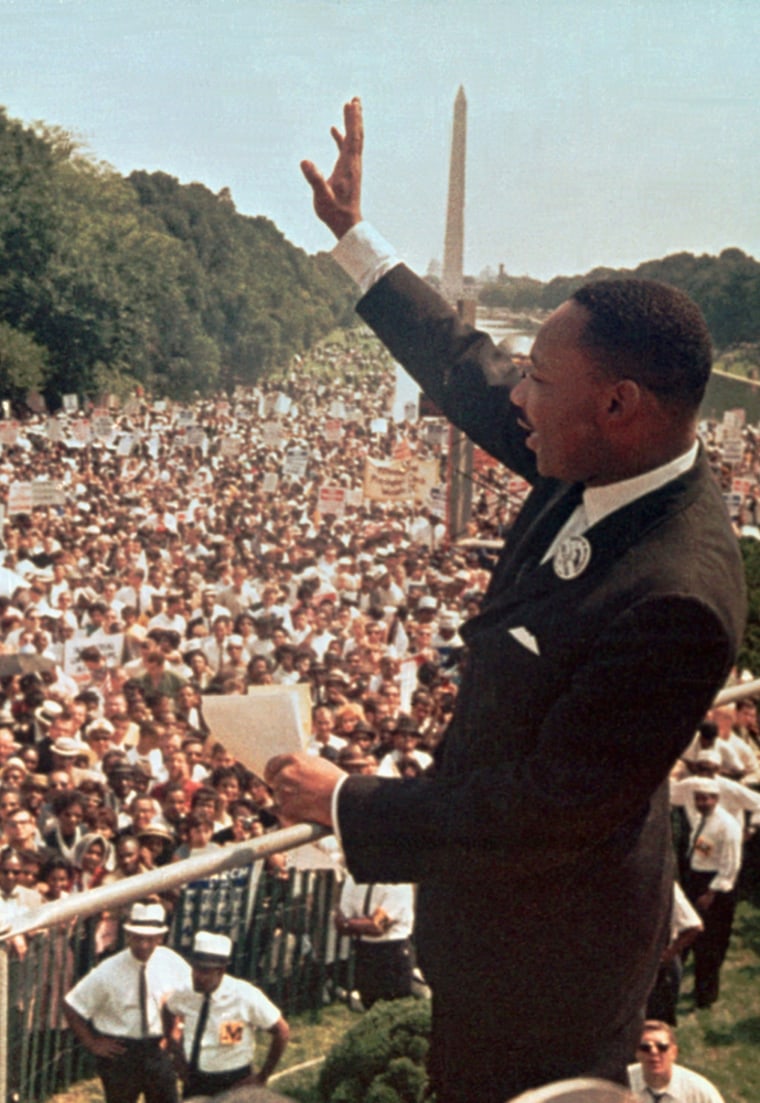Most Americans believe there has been significant progress in achieving Martin Luther King Jr.'s dream of racial equality, though blacks are more skeptical, an AP-Ipsos poll found.
Racial integration has swept across much of American life and blacks have gained economic ground since the height of the civil rights movement. Two decades ago, the government established a federal holiday in honor of the slain civil rights leader.
On some measures such as annual income, blacks have closed the gap considerably with whites over the past few decades, census figures show. The progress for blacks may have stalled, however, and some even fear a possible backlash.
'We've made progress'
"We've made great progress over the last 50 years," said Julian Bond, national chairman of the NAACP. "Progress has always been stop-and-start, and sometimes backup. We're in a holding pattern right now."
Three-quarters of those surveyed say there has been significant progress on achieving King's dream. But only 66 percent of blacks felt that way.
"At times I have felt that we've made progress," said Aubrey Jones, a black deputy warden at a state prison near Macon, Ga. "At other times, I feel we're at a standstill, especially when you come across instances of individuals being prejudiced."
The obstacles extend beyond instances of discrimination and prejudice.
"For a big portion of the African-Americans, there's not better education," said David Bositis, an analyst of black issues for the Joint Center for Political and Economic Studies. "There have been some gains made, but it's uneven. A lot of whites basically say: 'The civil rights movement has been done. I don't want to hear about it anymore.'"
Only 23 percent of respondents say they will do anything to commemorate the national holiday that took effect in 1986 after a lengthy campaign in Congress to honor King. A solid majority of blacks, 60 percent, say they will get involved in holiday activities.
Some say the civil rights movement sparked a backlash that could reverse gains.
Among those concerns are efforts to require a voter ID card in Georgia; the expected confirmation of conservative Judge Samuel Alito to be on the Supreme Court; immigration's effect on the job market for blacks; and an expected fight next year over reauthorization of the Voting Rights Act.
"Politically, the group that has gained the most after the civil rights movement was white Southern conservatives," Bositis said. "They have transformed the Republican Party, which has become the dominant political party."
Holiday participation
All 50 states gradually recognized a King holiday. But only one-third of businesses offer a paid holiday, according to the Bureau of National Affairs.
Participation in the holiday was enhanced by legislation passed in 1994 establishing the day as one of service.
In many places, people will help with projects aimed to improve the community and help the needy. Supporters of the holiday try to discourage businesses from using it as a marketing gimmick.
"Martin Luther King would turn over in his grave if he thought he was recognized by a day of shopping and rest," said former Sen. Harris Wofford, D-Pa., who worked with Rep. John Lewis of Georgia to establish the holiday as a day of service.
"The idea that it's a day on and not a day off is catching on. But the King holiday is well short of what it needs to be," Wofford said.

Three-fourths of those polled say King should be honored with a federal holiday. Blacks almost unanimously favored that, according to the poll of 1,242 adults that included an oversample of blacks.
The poll, taken Monday through Thursday, has a margin of sampling error of plus or minus 3 percentage points.
Accusations that King committed adultery and plagiarized material in academic writings emerged in the years after the holiday was established. Those claims remind people that King had human failings despite his larger-than-life image as a hero of the civil rights movement, said William Boone, a political scientist at Clark Atlanta University.
"It does not diminish the mission he was on," Boone said. "People now have a tendency to sanitize him, to make him more palatable to a broader spectrum of the American population."
For Latoya Williams, a black mother of four from Norfolk, Va., the holiday is a chance to remind her children what King accomplished to give them more opportunities in life. Her children respond with a weary, "We know, Ma."
Replays of King's soaring "I have a dream" speech from 1963 inspire Williams every time.
"When I hear that speech they play on TV every year," she said, "I still feel that dream."
